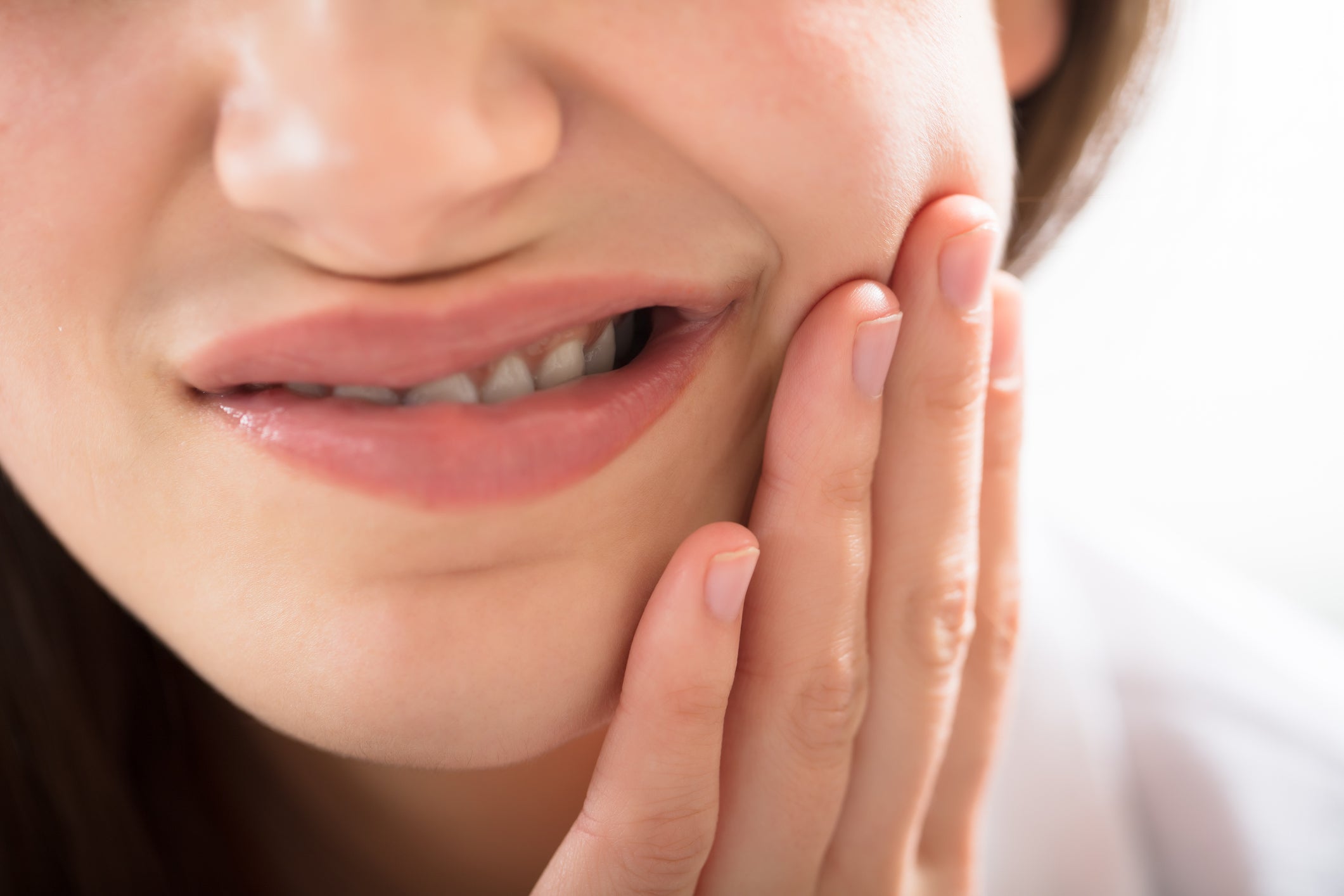-
Flu, Allergies, or Tooth Ache?

Woman unsure if she’s experiencing flu, allergy, or tooth ache symptoms.
Seasonal Health Dilemmas
Navigating the murky waters of cold weather ailments, many of us find ourselves puzzled: Is it the flu, allergies, or just a toothache? This confusion is not unfounded, as the symptoms of these conditions often overlap, affecting our oral health in unexpected ways.
The Flu and Oral Health
The common cold and the flu are notorious for causing discomfort beyond just a runny nose or a cough; they can also lead to tooth pain. This is primarily due to the close relationship between our sinuses and oral health. When we’re battling a cold or the flu, the inflammation in our sinuses can exert pressure on our dental nerves, particularly those near the upper teeth, causing a sensation that mimics tooth pain. This phenomenon, often mistaken for dental issues, is actually a side effect of our bodies fighting off the infection.
Medications and Oral Hygiene
Moreover, our oral health can take a hit during illness due to the medications we consume. Decongestants, while relieving nasal congestion, can lead to dry mouth by reducing saliva flow. Saliva is important for washing away food particles and bacteria, protecting our teeth and gums. A decrease in saliva can increase the risk of tooth decay and gum disease, exacerbating the sensation of tooth pain.
Allergies and Tooth Pain
Seasonal allergies compound this issue by affecting our oral cavity. Allergies can lead to sinus congestion and inflammation, putting pressure on our teeth and causing pain, particularly in the upper molars. This pressure is often due to the swelling of the sinus tissues, which, in turn, press against the roots of the teeth. The use of antihistamines, a common remedy for allergies, can also contribute to dry mouth, further increasing the risk of dental discomfort.
Maintaining Oral Health During Illness
Maintaining oral hygiene becomes even more crucial when we’re under the weather. Brushing, flossing, and staying hydrated can mitigate the effects of colds, the flu, and allergies on our oral health. However, distinguishing between a toothache caused by sinus pressure and one resulting from dental issues is essential. If tooth pain persists beyond the illness or is localized to one tooth, it may be time to consult a dentist.
Navigating Oral Health Through Seasonal Challenges
In conclusion, while the flu, allergies, and toothaches may present with similar symptoms, understanding their interconnections can help us better manage our health during these trying times. Regular dental check-ups, along with proper hygiene practices, can go a long way in keeping our teeth and gums healthy, regardless of the seasonal challenges we face.
Need assistance with a toothache?
Park 56 Dental has been the trusted solution in NYC since 1997. Our skilled team offers personalized care, from pediatric to sedation dentistry. Book a complimentary consultation today to address your sensitivity concerns and explore tailored treatment options. Experience comfort and convenience with our modern practice and comprehensive insurance coverage. Schedule your visit online or at 646-679-3973 now and start your journey to a sensitivity-free smile!
-
Natural Tooth Pain Relievers

If you’ve got a toothache, it can be hard to think of anything else. You may not want to take time off and see your dentist immediately, but what can you do for the constant, throbbing pain? Here, we offer a list of natural tooth pain relievers, to give you a little bit of extra grace before you schedule an appointment to have your tooth examined and find the root cause of your toothache.
- Try a saltwater rinse. Mix ½ teaspoon of salt into a glass of warm water, and when the salt dissolves, rinse your mouth. Because salt water is a natural disinfectant, this can be an effective treatment, reducing inflammation and healing wounds in the mouth while also loosening particles that could be stuck between the teeth.
- Rinse with hydrogen peroxide. Hydrogen peroxide kills bacteria, and can also reduce plaque, heal bleeding gums, and reduce pain and inflammation. It is important to properly dilute the hydrogen peroxide, mixing 3 percent hydrogen peroxide with equal parts water. Swish it around your mouth but do not swallow it.
- A cold compress can alleviate pain. The cold causes blood vessels to constrict, as well as reducing swelling and inflammation. This can help relieve pain, and a cold compress is particularly helpful if your toothache is caused by trauma. Wrap a bag of ice in a towel and hold it to the area for 20 minutes at a time, reapplying every few hours.
- Peppermint tea can have a numbing effect. It’s especially effective to apply a used tea bag, cooled tea bag to the affected area, when it’s slightly warm. Alternately, put a used tea bag into the freezer for a few minutes, then use the bag as a cold compress, applying it to the tooth.
- Garlic has long been known to have medicinal properties. Garlic has antibacterial and antimicrobial properties, and it acts as a natural pain reliever, as well as killing bacteria. To help with a toothache, crush a garlic clove into a paste and apply it to the area, or slowly chew a fresh garlic clove. It has to be fresh garlic, because other forms of garlic don’t contain the allicin that gives garlic its healing properties. As effective as it is, though, garlic does have side effects. Aside from having garlic breath, you may experience bloating, body odor, upset stomach, heartburn, acid reflux, an allergic reaction, or burning in the mouth.
- Thyme has antibacterial and antioxidant properties. It can help to treat toothaches and fight the bacteria that contribute to tooth decay. To get these benefits, you can chew fresh thyme, dilute thyme essential oil in carrier oil and apply it to the painful area, or add a drop of oil to a glass of water and use it as mouthwash.
- Vanilla extract contains alcohol, which can numb pain. What’s more, vanilla has proven antioxidant properties, which facilitate healing. It has to be real vanilla, not imitation, and it works when applied directly to the afflicted area.
- Clove is an ancient toothache remedy. Clove oil numbs pain and reduces inflammation, because it contains eugenol, a natural antiseptic. Dilute the clove oil with a carrier oil like jojoba or sunflower oil, using about 15 drops of clove oil to one ounce of the other oil. Be careful not to swallow it, but just apply the diluted clove oil to your mouth with a cotton ball. A drop of clove oil in a glass of water can also make an effective mouthwash.
- There is actually a plant called a toothache plant. A flowering plant that thrives in tropical and subtropical regions, the toothache plant contains spilanthol, a compound with anti-inflammatory properties. Chewing this plant can numb your mouth, but you shouldn’t use it if you are allergic to daisies, have prostate cancer, use diuretics or drink alcohol, or are pregnant.
- Guava leaves can help heal wounds. They have both anti-inflammatory and antimicrobial properties that are useful in helping with a toothache. To reap the benefits, chew fresh guava leaves or make a mouthwash by boiling guava leaves in water.
- Wheat grass has healing properties. Nutrients found in wheatgrass, including chlorophyll, provide anti-inflammatory, immune-boosting, and bacteria-fighting properties. You can use wheatgrass as a mouthwash but, unlike other mouthwashes, you can also drink it.
- Aloe vera can reduce pain and swelling in the mouth. It has both anti-inflammatory and antioxidant properties and can reduce pain and swelling. If you are taking medication to control blood sugar, though, talk to your doctor before using aloe vera, because it can potentially lower blood glucose to an unsafe level.
These home remedies can help, but the best thing to do for toothache is to see your dentist. A dentist can determine the cause of your toothache and come up with the best plan for treatment. At Park 56 Dental Group, we offer pediatric, prosthodontics, endodontics, oral surgery, Invisalign®, emergency, and sedation dentistry, all at the highest level of treatment. We serve the Midtown, Central Park, Upper East Side, Park Avenue, and all surrounding Manhattan and New York areas, with a patient-centered practice that has hours to fit your schedule. Schedule your complimentary consultation today by contacting us online or calling us at (212) 826-2322.
-
Issues That Can Cause Tooth Pain

Does your tooth hurt? You’re not alone. Millions of people suffer from tooth pain every year, and it can be a challenge to figure out the cause. Park 56 Dental in New York is here to help you sort through the possibilities. Let’s examine some of the common issues that can cause tooth pain.
Tooth Decay
One of the most common causes of toothache is decay or cavities in the teeth. When food particles remain on the teeth, they are broken down by bacteria which produce acids that erode away at tooth enamel. This eroding action causes holes in the teeth (cavities) which can be quite painful when exposed to hot or cold temperatures or when pressure is applied to them. Visiting your dentist regularly for checkups and cleanings can help prevent this type of pain by catching any cavities early and treating them before they become too severe.
Gum Disease
Gum disease occurs when poor oral hygiene allows bacteria to build up on your teeth and gums, leading to inflammation and infection in the area around your teeth. Gum disease can lead to receding gums, loose teeth, bad breath, and even tooth loss if left untreated — not to mention plenty of painful symptoms! A good preventive measure for avoiding gum disease is to brush two times a day for two minutes each time, flossing once per day as well as seeing your dentist regularly for checkups and cleanings.
Infection
A dental infection occurs when bacteria enter an area inside or around a tooth where it doesn’t belong – such as an abscessed tooth/root canal or wisdom teeth coming through improperly – leading to swelling and pain. If an infection has reached this point, it will likely require professional treatment by a dentist such as antibiotics or even extraction in some cases. Regular visits with your dentist will help keep infections at bay by identifying any potential issues early on before they have a chance to escalate into something more serious requiring more intervention from your dental team.
How to Avoid Tooth Pain
One of the worst sensations is tooth pain; it’s sharp, agonizing, and often comes out of nowhere. Most tooth pain is caused by tooth decay or an abscessed tooth, but there are several steps people can take to help avoid toothaches. Brushing twice daily for two minutes, as well as flossing every day can help ensure that food does not get stuck in between teeth and cause issues. Additionally, remember to use toothpaste with fluoride; this helps protect the enamel on our teeth, which is the protective outer coating to the tooth. Also, be sure to rinse the mouth after meals, and stay away from sugary drinks and snacks. Too much sugar can erode tooth enamel over time. Taking these simple steps can help you prevent tooth pain in the long run.
Visit Park 56 Dental Today!
No one likes dealing with tooth pain, but unfortunately, it’s something that many people experience at some point in their lives. At Park 56 Dental in New York, we understand how difficult it can be when trying to identify what might be causing the discomfort. Contact us today to schedule an appointment or book online!
RECENT POSTS
categories
- Uncategorized
- Cosmetic Dentistry
- Veneers
- Healthier Teeth
- Teeth Whitening
- Dental Health
- Video
- Dental Emergencies
- Invisalign
- Dental Implants
- Root Canal
- Sedation Dentistry
- Infographic
- Dental Crowns and Bridges
- Dental Anxiety
- Gum Disease
- COVID-19
- Bad Breath
- New York Dentist
- Cut out sugar
- General Dentistry
- Oral Health
- Oral Cancer
- Dry Mouth
- Gum Health
- Toothache
- Dental Sealants
- Cavities



